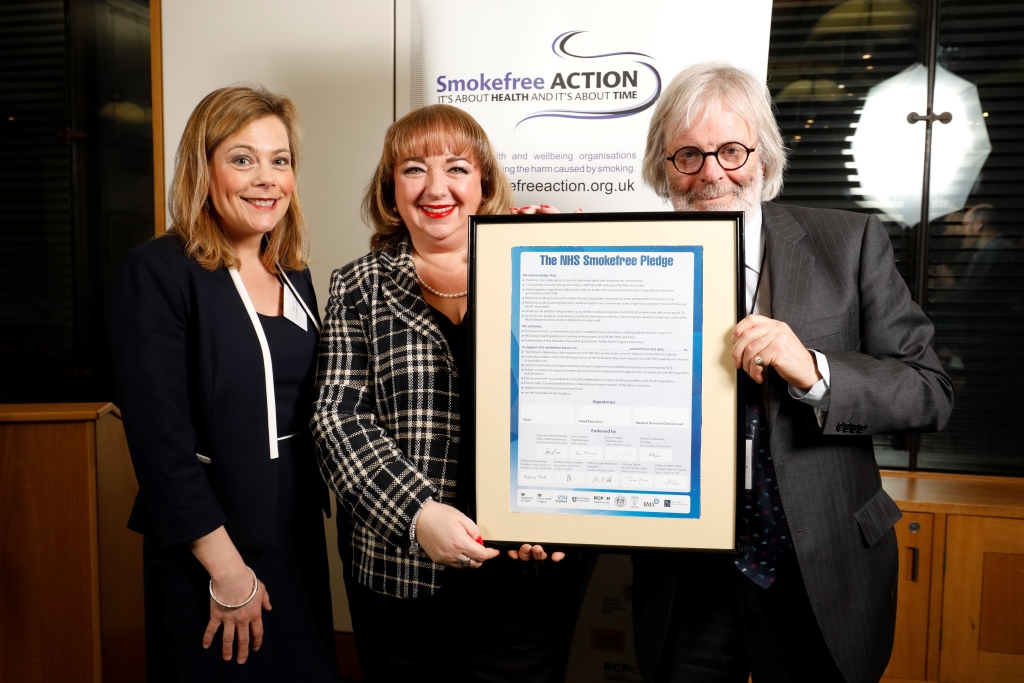NHS can do more to help smokers quit

A NORTH East doctor and Fresh were in Parliament today at the launch of a new call for the NHS to do more to help prevent hospital admissions and deaths from smoking.
NHS organisations across the country are urged to sign the NHS Smokefree Pledge [1] to support patients to quit and create tobacco free environments that support them to stop.
The Pledge has been developed by the Smokefree Action Coalition [2] and endorsed by Steve Brine MP, the Public Health Minister, Simon Stevens, Chief Executive of NHS England, Duncan Selbie, Chief Executive of Public Health England, and other health leaders [3].
The pledge supports work in the North East, where a Smokefree NHS/ Treating Tobacco Dependency taskforce has been set up to work with NHS Trusts to ensure all patients who smoke are offered support to quit, with a goal of April 2019 for all the region’s NHS Trusts to be implementing NICE guidance for smoking.
Smoking is the leading cause of premature death and disease with one in two smokers being killed as a result of lifetime tobacco smoking. It also places a major burden on the NHS with 1 in 4 patients in hospital smoking [4].
In the North East, smoking results in 104 hospital admissions every day and over 38,000 a year at a time when the NHS is under more pressure than ever [5].
The Commitments in the Pledge include:
- Treat tobacco dependency among patients and staff who smoke – as set out in the Tobacco Control Plan for England.
- Ensure that all hospital patients have access to the medication they need to quit in line with NICE guidance on smoking in secondary care
- Create environments that support quitting through smokefree policies as recommended by NICE
Helping to launch the Smokefree Pledge in Parliament is Dr Tony Branson, Consultant Oncologist with Newcastle Hospitals’ and Clinical Lead for the Northern Cancer Alliance, and who is also the co-Chair of the North East Smokefree NHS/ Treating Tobacco Dependency Taskforce [6].
Dr Branson said: “Tobacco is the single biggest cause of cancer, kills smokers on average 10 years early and is one of the main causes of hospital admissions. As providers of healthcare we must be more proactive in asking about smoking and offering help and support to quit.
“The NHS is more stretched than ever before but treating tobacco dependency is one of the single most effective ways we can improve outcomes for patients, and reduce the chances of them being re-admitted to hospital.
“This is a vital opportunity for the NHS to tackle this issue and help us reduce the burden of smoking related diseases on our wards and across local communities.”
Ailsa Rutter, Director of Fresh, said: “A patient who continues to smoke has a one in two chance of being killed by tobacco addiction unless they quit. As well as treating immediate conditions, doctors, nurses and GPs are in a unique position alter the course of a patient’s long term health.
“The North East has set a vision of 5% of people smoking by 2025 and if we are to get there, the NHS must play a strong prevention role. The evidence is strong that tackling smoking is cost effective and can save the NHS millions of pounds.”
In the North East, a regional initiative to tackle smoking in pregnancy by helping midwives to raise the issue with women who smoke helped reduce maternal smoking from 22% to 16%, and resulted in a doubling of quitting rates among women who smoke.
Simon Stevens, Chief Executive of NHS England, said: “Most smokers want to quit and we’re seeing good progress on lower smoking rates. To build on this we’d now like to see NHS organisations across the country sign up to the NHS Smokefree Pledge.”
Duncan Selbie, Chief Executive of Public Health England, said: “The NHS admits a patient every minute because of a smoking related disease and 1 in 4 beds are occupied by a smoker. Given that most smokers want to quit, this is an unparalleled opportunity for NHS staff to do all possible to help them quit.
“NHS England has committed hospitals and mental health services to become truly smokefree by 2019 and I am delighted that the Smokefree Action Coalition has made it possible for each of them to publicly pledge their commitment to this.”
A report by the British Thoracic Society [7] in 2016 found that support to quit smoking is not routinely offered to patients, with nearly three out of four patients not asked if they would like to quit and only 1 in 13 patients who smoke referred to stop smoking support.
How Treating Smoking Helps the NHS
Quitting smoking is associated with:
- reducing the likelihood of unplanned hospital emergency admissions
- speeding up recovery and wound healing after operations and reducing the chances of an infection
- enhanced response to lung cancer therapy
- helping prevent dementia
- reducing childhood asthma and respiratory disease
Facts About Smoking
- Smoking causes over a quarter (28 per cent) of cancer deaths in the UK and nearly one in five cancer cases [7]
- Smokers are almost twice as likely to have a heart attack compared with people who have never smoked [9]
- smokers are three times more likely to have a stroke than non-smokers [10]
- smokers are 30–40% more likely to develop type 2 diabetes than nonsmokers [11].
- People with diabetes who smoke are more likely than non-smokers to have trouble with insulin dosing and with controlling their disease. Smokers with diabetes have higher risks for serious complications, including heart and kidney disease and poor blood flow in the legs and feet that can lead to infections, ulcers, and possible amputation (removal of a body part by surgery, such as toes or feet.
References
[1] Link to signed pledge online
[2] Smokefree Action Coalition website – http://smokefreeaction.org.uk/
[3] Linked to signed pledge online
[4] Agrawal. S, Mangera. Z British Thoracic Society Smoking Cessation Audit Report, 1 April-31 May 2016.
[5] PHE Fingertips tool
[6] The regional Smokefree NHS/ Treating Tobacco Dependency Taskforce is co-chaired by Dr Tony Branson and Prof Eugene Milne, Director of Public Health for Newcastle City Council. This launched in April 2017, with senior membership from a wide range of clinical specialities, the broader NHS and the public health system. It has been tasked with a significant upgrade in prevention and treatment of tobacco dependency. One of its key priorities is to support NHS Trusts in implementing smoking cessation support and Smokefree policies in line with NICE Guidance PH48.
[7] https://www.brit-thoracic.org.uk/pressmedia/2016/uk-hospitals-fail-to-meet-national-standards-in-helping-patients-to-quit-smoking/[8] http://www.cancerresearchuk.org/about-cancer/causes-of-cancer/smoking-and-cancer/smoking-facts-and-evidence#smoking_facts0
[9] https://www.bhf.org.uk/heart-health/risk-factors/smoking
[10] http://www.stroke.org.uk/sites/default/files/Smoking%20and%20the%20risk%20of%20stroke.pdf
[11] https://www.cdc.gov/tobacco/campaign/tips/diseases/diabetes.html
